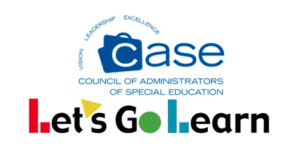Explore more topics in special education
In partnership with the National Council of Administrators of Special Education (CASE), this week Let’s Go Learn presented a webinar that shares educators’ best practices for implementing remote learning in the context of special education. The webinar included discussion of the current environment, as well as a lengthy Q&A session for a panel of experts in the second half. The first half of the hour-long webinar discussed:
- Current federal regulations concerning special education students and school closures
- Regulatory changes being pursued
- Key priorities for special education students and educators
- Best practices for implementing emergency and long-term remote learning
- Considerations for special education students in a remote learning environment
To view a recording of the webinar, register at the following address and you will immediately gain access to a recorded video.
https://register.gotowebinar.com/register/1982390184362996491
The U.S. Department of Education enforces Section 504 of the Rehabilitation Act of 1973 in programs and activities that receive funds. The Department of Education defines Section 504 this way:
“The Section 504 regulation requires a school district to provide a ‘free appropriate public education’ (FAPE) to each qualified person with a disability who is in the school district’s jurisdiction, regardless of the nature or severity of the person’s disability.“
If your student’s school is completely closed, FAPE does not require that any services be provided. However, most school districts are now open to some degree, ranging from providing homework packets via email, to providing full-blown online courses over broadband internet. For special education students, teachers are doing their best to provide services to the degree their district can, but the Individuals with Disabilities Education Act (IDEA) was not written with a pandemic of this magnitude in mind, so some or many services may not be available in the usual capacity.
Special Education teachers are struggling to resolve evaluations and finding that the majority of evaluations can not be done from a distance. Teachers need to be with students in person to make accurate evaluations. Over 50% in one CASE poll were out of compliance on IEP reporting, including complaint timelines. School districts are hoping that the Department of Education will be flexible during the pandemic.

Online tools for special education
In the webinar, Let’s Go Learn provided remote learning framework tips for special education students, based on their experience as a leader in online learning for the past 20 years, as well as their experience reacting to the COVID-19 pandemic. Some of the tips include:
- Families need to advocate for districts to give them a single point of contact through which all information will be communicated.
- Data should be stored “in the cloud” and not on local storage devices in or attached to your computers at home. Data in the cloud is securely backed up and stored. This helps prevent loss of data from a computer failing. For example, you can use a free Google Docs or Microsoft OneDrive site to store your student’s data, and give permission to appropriate teachers or school staff.
- Make sure your student’s school has a solid curriculum plan, and is not just having teachers use ad-hoc, freeware tools. Schools should be using full-featured, personalized solutions.
- Students should have clear meeting, timing, and requirement protocols from their schools.
- Teachers should have open office hours where your student can get personalized help remotely.
Let’s Go Learn is supporting special education in several important ways. First, Let’s Go Learn provides remote learning for Tiers 1, 2 & 3. The company also provides support for FAPE compliance, as well as SDI, including progress monitoring. Finally, Let’s Go Learn provides long-term streamlining of the entire IEP process. They do all of this by gathering and interpreting diagnostic data natively in their online system.
The panel of experts in the webinar included:
- Phyllis Wolfram, Executive Director, National CASE
- Erin Maguire, President, National CASE
- Dr. Kurt Hulett, former Vice President of Special Education Services, Let’s Go Learn
- Richard Capone, CEO/Chief Technologist, Let’s Go Learn


Hello my grand daughter lives in Everett Wa, and she attended special education classes , there
was a shooting at this this school, and my grand daughter stopped going.
she needs help to get into school or some training, time has gone by, and I believe she is too old
(she,s 21)for regular special HS class IEP, but there are other programs,I am in Calif. and need
help to help her.
Thank You
Victoria Osollo/ 7/21/2020